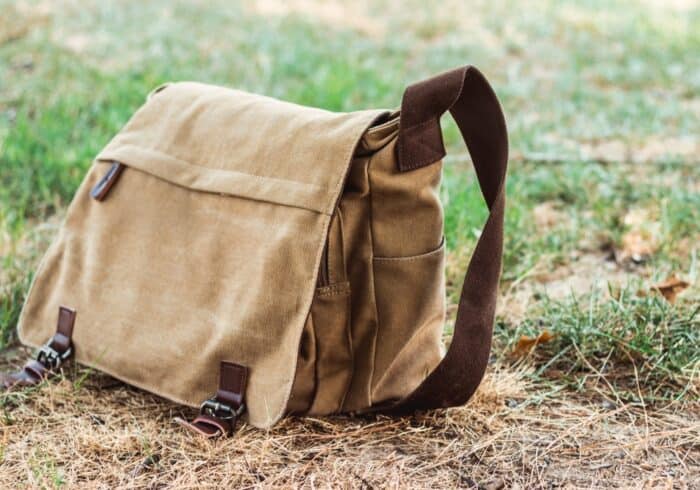1. What are the benefits of using hemp fabric?
Hemp fabric is becoming more popular because of some of its advantages over traditional fabrics.
It’s a sustainable, long-term fabric solution that’s a fantastic choice for those looking for more responsible textile options.
Related: Does Hemp Take A Lot Of Carbon Out Of The Air?
Here are some benefits of hemp fabric:
Durability: Hemp fabric is more durable than cotton and other fabrics. It’s excellent for clothing and other stuff that requires extended use. Hemp fabric can withstand wear and tear better than traditional fabrics and is less likely to shrink or fade.
Versatile: Hemp fabric is incredibly versatile because of its unique combination of strength and softness. It can be used in place of almost any other fabric and hopefully will someday be the top choice overall.
Sustainable: Hemp is more sustainable because it requires significantly less water and fertilizer than cotton and other fabric materials. The hemp plant also absorbs more carbon dioxide than trees, making it a great choice for eco-friendly clothing.
Hypoallergenic: Hemp fabric is hypoallergenic and less likely to irritate sensitive skin compared to traditional fabrics. This makes it a great option for those with allergies or sensitive skin.
Breathable: Hemp fabric is naturally breathable and moisture wicking, keeping you cool and dry during hot days. It is also antimicrobial which can help to reduce odors and bacteria.
Affordable: It can be a cost-effective option when compared to other eco-friendly fabrics. The more popular it gets, the less expensive and available it will be.
UV Resistant: Hemp fabric is also UV resistant, meaning it will not fade or become brittle when exposed to sunlight. This makes it a great choice for outdoor use or for clothing that is exposed to lots of sunlight.
Renewable: Hemp is a renewable resource. It can be grown again and again without depleting the land. This makes it a great a sustainable, long-term solution for fabric.
Non-Toxic: It’s also non-toxic. It’s free of harsh chemicals and toxins that can be harmful to humans and pets.
2. Is hemp fabric durable?
Yes, hemp fabric is durable and known for its strength and longevity. It’s more resilient than traditional fabrics like cotton and is far less likely to shrink or fade.
It’s also UV resistant, so it will not become brittle or fade in sunlight. It’s also very strong and can withstand wear and tear much better than comparable fabrics.
3. Is hemp fabric easy to care for?
Yes, hemp fabric is fairly easy to care for. As with any fabric, it’s important to follow the manufacturer’s care instructions. Usually it can be machine washed and sometimes even dried in a dryer.
It is important to avoid using chlorine bleach or fabric softeners that can damage the fibers. Try to avoid high temperatures when drying hemp fabric.
4. Does hemp fabric feel comfortable against the skin?
Most of the time, hemp fabric that’s made to be worn is soft and comfortable against the skin.
It has a great combination of strength and softness, which makes it ideal for clothing.Hemp clothes are often breathable, moisture-wicking and hypoallergenic. It makes fantastic summer and exercise clothes.
Related: What Is Industrial Hemp?

5. What kind of items can be made of hemp fabric?
Hemp fabric can be used in place of almost any traditional cotton fabric.
Common items made with hemp fabric include clothing like shirts, pants, skirts, jackets, and dresses, as well as hats, bags, shoes, and other accessories.
It’s also becoming more popular for upholstery, bedding, and curtains. It can also be used to make rugs, towels, and other home decor items.
6. How does hemp fabric compare to other natural fabrics?
Hemp fabric is a stronger and more durable natural fabric than other fabrics. It’s resistant to wear and can last a lifetime if cared for in the right way.
Most of the time, it’s more sustainable than traditional fabrics, helping to reduce its environmental impact.
Another common eco-friendly fabric is bamboo fabric.
Hemp fabric and bamboo fabric are often compared because of their similarities in terms of sustainability and durability. Both fabrics are eco-friendly and renewable. However, there are a few differences between the two.
Hemp fabric is stronger, more durable, and more resistant to wear than bamboo fabric. It also has better moisture-wicking properties and is UV resistant.
Bamboo fabric, on the other hand, is softer and more luxurious feeling than hemp fabric. It can be more breathable and thermoregulating, making it a great choice for those who want a fabric that is lightweight and comfortable.
7. How much does hemp fabric usually cost?
The cost of hemp fabric depends on where it comes from and the quality of the fabric.
Since it’s not as popular as other options like bamboo fabric, it can sometimes be the more expensive alternative. But as hemp becomes more widely accepted and grown, the price should go down.
Related: What Makes Hemp Paper Better & Why We Should Be Using It
8. Is hemp fabric environmentally friendly?
Yes, hemp fabric is an environmentally friendly fabric choice when compared to a lot of the other fabrics out there.
A hemp plant absorbs more carbon dioxide than trees per square foot, making it a great choice for eco-friendly clothing. It also requires significantly less water and fertilizer than cotton.
Finally, it’s non-toxic, meaning it is free of harsh chemicals and toxins that can be harmful to humans.
9. Is hemp fabric breathable?
Yes, hemp fabric is naturally breathable and moisture wicking, keeping you cool and dry during hot days.
It also helps to reduce odors and bacteria because of its antimicrobial properties.
10. Does hemp fabric shrink or stretch?
Hemp fabric does not typically shrink or stretch when washed and dried correctly.
However, it is important to always follow the manufacturer’s care instructions and to avoid high temperatures when drying hemp fabric, as it can cause shrinkage.
It’s more durable and resistant to wear and tear than other fabrics, making it less likely to stretch or shrink over time.
Leave a comment below if you’d like to add to our list of common hemp fabric questions.

